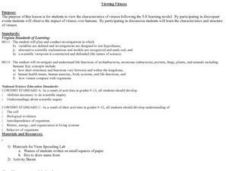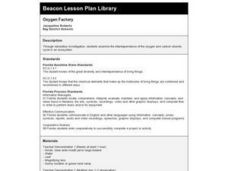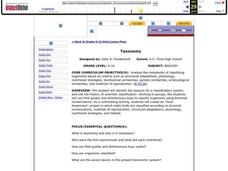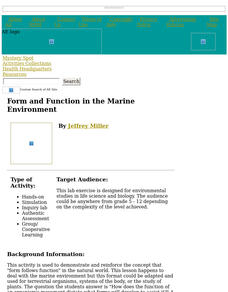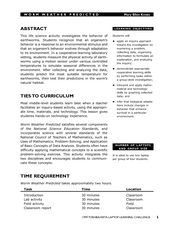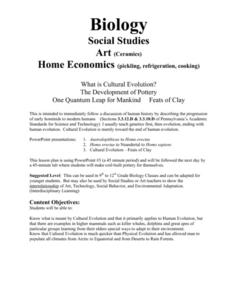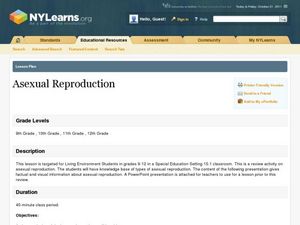Curated OER
Genetic Variations in Hand Span Size
Students study genes. In this biology lesson plan, students measure their handspan size to determine if one pair or many pairs of genes control that trait.
Curated OER
Genetics Mendelian
High schoolers explore genetic terms, the Law of Dominance and the contributions of Gregor Mendel. After discussing Mendel's lab and his pea plants students observe examples of a phenotype chart. Afterward, they conduct their own lab to...
Curated OER
Collaboration via Slime Mold
Students combine the skills and concepts that they have developed to ask a simple question which can be answered on a Petri plate. They ask questions and design experiments for verification through collaboration with their classmates.
Curated OER
The Last Great Canal
Students read about a cholera outbreak in the 1840's. They read maps, predict how cholera moved throughout the country and participate in a lab activity that demonstrates how disease is spread. They compare cholera through time.
Curated OER
Where Do I Belong?
Tenth graders study the diversity of life in the world. They classify and sketch organisms into the 6 kingdoms.
Curated OER
Viewing Viruses
Students view the characteristics of viruses following the 5-E learning model. By participating in discrepant events Students observe the impact of viruses over humans. By participating in discussion students examine the characteristics...
Curated OER
Oxygen Factory
Fourth graders examine the interdependence of the oxygen and carbon dioxide cycle in an ecosystem through a laboratory investigation. After a lecture/demo, 4th graders complete the lab in groups.
Curated OER
Taxonomy
Students analyze the complexity of organism classifications based on certain criteria. In this classifying organisms lesson students study taxonomy and gather information and leaves to do their own experiment on classification.
Curated OER
Introduction to Scientific Theory
Ninth graders explain how scientists set up investigations. In this scientific process lesson, 9th graders review the principles of the scientific method and use these skills to answer an open-ended question about how to set up a...
Curated OER
Form and Function in the Marine Environment
Students study the relationship of form and function in the marine environment.
Curated OER
Yeast Cells and their Environment
Students study the scientific method and explore how to design an experiment. In this investigative lesson students explore and hypothesis an experiment then carry it out to find the results.
Curated OER
Off Base
Students study La Chatelier's principle and identify how carbon dioxide may affect pH. In this coral lesson students complete a worksheet on pH and observe a lab.
Curated OER
Cracking the Code - Cloning Paper Plasmid
Students explore the "genetic code." They observe how genes may be manipulated for genetic research, gene cloning, and genetic engineering. In a lab setting, students examine the mechanics involved in cutting and ligating DNAs into a...
Curated OER
Animals of the Fire Ice
Students study ice worms and describe how they interact with other species. In this methane hydrate instructional activity students study ice worms and hydrate shrimp to learn their behavior and can participate in an optional...
Curated OER
Worm Weather Predicted
Students examine worm habitats. In this animal habitats lesson, students participate in a lab activity that requires them to explore the adaptations that earthworms make to their environment.
Curated OER
Whose Skeleton is in Your Closet?
Students analyze and measure parts of a model skeleton to determine sex, race, height and age. They produce a lab report from their inquiries.
Curated OER
Microbiology Lesson Plan Aseptic Technique
Students examine the importance of aseptic technique, become familiar with media plates, and general microbiology techniques. They study the benefits and dangers of bacteria and other microorganisms in their lives.
Curated OER
Water Quality Monitoring
Learners study the water quality of a stream in their area, by measuring the temperature, pH, alkalinity and conductivity. They integrate biology with earth science when using the microscope to study the living organisms in the water.
Curated OER
Stream Chemistry Monitoring
Students become familiar with real-world gathering of chemical data. The experience how the science is done: the nature of analysis, data collection, interpretation, and presentation. They study a nearby body of water for their experiment.
Curated OER
Analysis of Lobster Claw Function. An Exercise in Biomechanics
Pupils observe two chelae. They write three differences they observe in their notebooks. Students suggest a hypothesis which would explain these differences. They dissect the chela. Pupils analyze the lobster claw as a mechanical lever.
Curated OER
Transcription, Translation, and the Genetics of Microbes
Pupils construct various virus models using Fruit loops and Alphabits to represent nucleotides and molecules. They constructs capsomeres using shoes as the capsomeres and discuss various viruses.
Curated OER
What is Cultural Evolution?
Students comprehend what is meant by Cultural Evolution and that it primarily applies at Human Evolution, but that there are examples in higher mammals such as a killer whales, dolphins and great apes of particular groups by exploring...
Curated OER
Norman Suburban Activity
Students analyze the factors affecting organisms in the pond ecosystem. In this environmental science activity, students perform an experiment to determine pH, nutrients and temperature of different pond sites. They present their result...
Curated OER
Asexual Reproduction
Sixth graders investigate how asexual reproduction produces single-parent offspring. They use plants and yeast to demonstrate vegetative propagation and budding in a laboratory. Students draw five different types of asexual reproduction.







